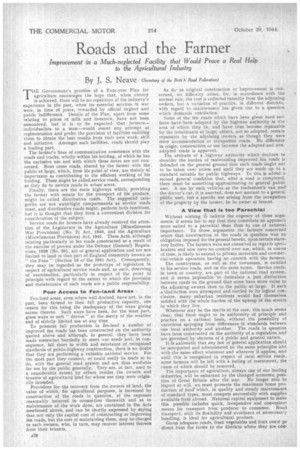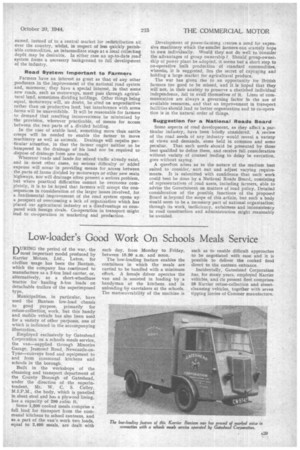Roads and the Farmer
Page 30

Page 31

If you've noticed an error in this article please click here to report it so we can fix it.
Improvement in a Much-neglected Facility that Would Prove a Real Help. to the Agricultural Industry By J. S. Neave (Scat:cry of the Briti It Road Federation) THE Government's promise of a Four-year Plan for agriculture encourages the hope that, when victory is achieved, there will be no repetition of the industry's experience in the past, when its essential services in war were, in time of peace, rewarded by official neglect and public indifference. Details of the Plan, apart from some relating to prices of milk and livestock, have not been announced, but it is to be expected that farmers— individualists to a man—would resent any attempt at regimentation and prefer the provision of facilities enabling them to obtain the best results from their own work, skill and initiative. Amongst such facilities, roads should play a leading part.
The farmer's lines of communication commence with the roads and tracks, wholly within his holding, of which he has the exclusive use and with which these notes are not concerned. Next come roads, shared by the farmer with the public at large, which, from his point of view, are mainly of importance as contributing to the efficient working of his holding. These might be called.service roads, corresponding as they do to service roads in urban areas.
Finally, these are the main highways which, providing the farmer with means for the transport of his produce, might be called distributive roads. The suggested categories are not watertight compartments as service roads must, and distributive roads might, perform both functions, but it is thought that they form a convenient division for consideration of the subject.
Service roads for farmers have already received the attention of the Legislature in the Agriculture "(Miscellaneous War Provisions) (No. 2) Act, 1940, and the Agriculture (Miscellaneous Provisions) Act, 1941. These Acts, although relating particularly to fen roads constructed as a result of the exercise of powers under the Defence (General) Regulations, 1939 (No. SO), are of general application and are not limited to land in that part of England commonly known as " the Fens " (Section 15 of the 1941 Act)... Consequently, they may be regarded as the prototype of legislation in respect of agricultural service roads and, as such, deserving of examination, particularly in respect of the point of principle with regard to the extent to which the provision and maintenance of such roads are a public responsibility.
Poor Access to Fen-land Areas Fen-land areas, even where well drained, have not, in the past, been farmed to their full productive capacity, one reason for this being the inadequacy of the ways giving access thereto. Such ways have been, for the most part, grass ways or soft " droves" at the mercy of the weather and of strictly limited use at any time. To promote full production in fen-land a number of improved fen roads has been constructed on the authority quoted abrive and although, in general, they have been made somewhat hurriedly to meet war needs and, in consequence, fall short in width and substance of recognized standards of public-highway construction, there is no doubt that they are performing a valuable national service. For the most part they connect, or could easily be made so to do, with the general road system and are thus available for use by the public generally. They are, in fact, used to a considerable extent by others besides the owners and tenants of agricultural land for whose use they were originally intended.
Provisions for the recovery from the owners of land, the value of which, for agricultural purposes, is increased by construction of the roads in question, of the expenses reasonably incurred in connection therewith and as to maintenance of the work done, are contained in the Acts mentioned above, and can be shortly expressed by saying that not only the capital cost of constructing or improving fen roads, but the cost of maintaining them, may be charged to such owners, who, in turn, may recover interest thereon from their tenants, • As far as original construction or improvement is concerned, no difficulty arises, for, in accordance with the normal rule, the cost is collected rateably from the adjoining owners, but a variation of practice, in different districts, with regard to maintenance has given rise to a question which demands ventilation.
Some of the fen roads which have been given hard surfaces have been adopted by the highway authority in the area of which they lie, and have thus become repairable by the inhabitants at large; others, not so adopted, remain repairable by the adjoining owners as though they were mere accommodation or occupation roads. No difference in origin, construction or use between the adopted and nonadopted roads is apparent.
The attitude of a highway authority which declines to shoulder the burden of maintaining improved fen roads is defended on the general ground that such roads ought not to be taken over unless and until they are made up to a standard suitable for public highways. To this is added a second general condition that, after a road is completed. there must be something approximating to general public user. A use by such vehicles as the tradesman's van and' the doctor's car, it is asserted, does not amount to a general public user, but a specific use arising from the occupation of the property by the farmer, be he owner or tenant.
A View that is too Parochial Without wishing tO belittle the cogency of these arguments, it seems fair to say that they constitute an approach more suited to a parochial igsue than to one of national importance. To those arguments the farmers concerned retort that construction of the roads in question was an
obligation imposed for the general benefit, upon certain statutory bodies. The farmers were not consulted as regards specification and now have no control over use, which, in course of time, is likely to extend to private motorists and commercial-vehicle operators having no concern with the farmers.'
The countryman, as well as the townsman, is entitled to his service roads, and on the same terms. Service roads.
in town or country, are _part of the national road system.
and it seems impossible ' to formulate a just distinction between roads on the ground that some have more value to
the adjoining owners than to the public at large. If such a•distinction were attempted and carried to its logical conclusion, many suburban residents would find themselves saddled with the whole burden of the upkeep of the streets in which they live.
Whatever may be the merits of the case, this much seems clear, that there ought to be uniformity of principle and practice on a national basis, without the possibility of variations springing from differences in standards between one local authority and another. The roads in question have been constructed on the authority of a regulation and are governed by statutes of a public and general nature.
It is axiomatic that any law of general application should be interpreted and administered on the same principles and with the same effect whenever and wherever it applies, and until this is recognized in respect of rural service roads, some farmers will be left with a feeling of resentment, the cause of which should be removed.
The importance of agriculture, always one of our leading industries, will be enhanced by the changed economic posi tion of Great Britain after the war. No longer able to import at will, we must promote the maximum home production of food' which, in quality and steady maintenance of standard types, must compete successfully with supplies available from abroad. National capital equipment to make this possible includes quick, inexpensive and convenient means for transport from producer to consumer. Road transport, with its flexibility and avoidance of unnecessary handling, is ideal for agricultural produce.
Given adequate roads, fresh vegetables and fruit could go direct from the farms to the districts where they are con..
aimed, instead of to a central market tor redistribution ad over the country, whilst, in respect of less quickly perishable commodities, an intermediate stage at a local collecting depot may be desirable, In either case an up-to-date road system forms a necessary background to full development of the industry.
Road System Important to Farmers Farmers have an interest as great as that of any other producers in the improvement of the national road system and, moreover, they have a special interest, in that some new roads, such as motorways, must pass through agricultural land, sometimes dividing holdings. Other things being equal, motorways will, no doubt, be sited on unproductive rather than on productive land, but interference with some farms will be unavoidable. It will be reasonable for farmers to demand that resulting inconvenience be minimized by the provision, wherever practicable, of means for access between the two parts of a divided holding.
In the case of arable land, something more than cattle creeps will be needed to enable the farmer to move machinery as well as animals. Drainage will require particular attention, in that the farmer ought neither to be hampered in the drainage of his land nor be required to dispose of drainage from new roads.
Wherever roads and lands for mixed traffic already exist, and in most other cases, no serious difficulty or added expense will occur in providing means for access between the parts of farms divided by motorways or other new main highways, nor will drainage often present a serious problem, but where practical difficulties cannot be overcome completely, it is to be hoped that farmers will accept the consequences in consideration of the larger issues involved, for a fundamental improvement of the road system opens up a prospect of overcoming a lack of organization which has placed our agricultural industry at a disadvantage as compared with foreign rivals. Co-operation in transport might lead to co-operation in marketing and production.
Development at power-farming creates a need for expensive machinery which the smaller farmers can scarcely hope to own individually. Would they not do well to consider the advantages of group ownership ? Should group-ownership of power plant be adopted, it seems but a short step to co-operative bulk production of standard commodities, wherein, it is suggested, lies the secret of capturing and holding a large market for agricultural produce.
The war has given rise to an opportunity for British farmers too good to be missed, and it is hoped that they will not, in their anxiety to preserve a cherished individual independence, fail to avail themselves of it. Lines of communication are always a governing factor in the use of available resources, and that an improvement in transport facilities should lead to better organization and to co-operation is in the natural order of things.
Suggestion for a National Roads Board Some aspects of road development, as they affect a particular industry, have been briefly considered. A review of the road needs of any industry would reveal a variety of views and demands, some held in common and some peculiar. That such needs should be presented by those best qualified to define them, and receive full consideration without variety of counsel leading to delay in execution, goes without saying.
A question arises as to the nature of the medium best suited to consider, sort out and adjust varying requirements. It is submitted with confidence that such work could best be done by a National Roads Board, consisting of representatives of road users, including farmers, able to advise the Government on matters of road policy. Detailed consideration of the possible functions of the proposed Board is beyond the scope of this article, but such a body would seem to be a necessary part of national organization: through its work, inefficiency, unfairness and inconsistency in road construction and administration might reasonably be avoided.




















































